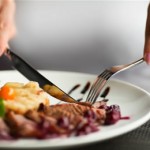Irritable Bowel Syndrome (IBS) Foods to Avoid List
There is no single, best diet that works for all people with irritable bowel syndrome (IBS or also known as ‘spastic colon’). This is reasonable because the list of foods to avoid (some that can set off IBS) can vary from person to person. If you have this syndrome, you may need to take a trial process before finding the best one that works.
Fortunately, spastic colon is manageable. With a good plan and strategy, you should be able to control it as well. And the good news, your diet really can help. Your doctor should provide a completely guide of your treatment plan. But if you still don’t have idea where to start, diet for IBS is outlined below.
In general, doctors classify this syndrome based on the cluster of signs and symptoms. This include:
- Spastic colon with alternating constipation & diarrhea.
- Spastic colon with diarrhea (abdominal pain /discomfort, urgency, and watery stools from bowel movement ‘diarrhea’).
- Or spastic colon with constipation (abdominal pain /discomfort, bloating, and harder stools from bowel movement ‘constipation’).
By knowing the type of spastic colon that you suffer from, your doctor can give the best treatment plan. That’s why, it is important to tell all of your symptoms to your doctors.
Foods that you eat are not the cause of the problem – many experts have confirmed this issue. But it’s clear that some may worsen the symptoms. And you need to find them as much as possible then avoid them in your diet!
Read the label of foods, even read also carefully the label of each counter medicine that you take! If necessary, write down the list of ‘before’ and ‘after’ eating suspicious foods so you can easily find foods to avoid.
As mentioned before, what to avoid in diet for people with IBS can vary. However in general, the following foods are considered bad if you have the condition.
Dairy Products
Most patients find that some dairy products can worsen their spastic colon symptoms (such as constipation and diarrhea). These include butter, ice cream, milk, cheese, or other dairy products. Diary components like whey, casein, milk fat, and lactose also should be restricted!
According to NIH, the consumption of dairy products (especially if consumed too much) can lead to negative reactions with the digestive system, leading to bloating, gas, and other abdominal discomforts – this even may occur in people without lactose intolerant problem.
List of beverages you need to avoid!
Carbonated beverages, alcohol, and caffeinated drinks are also bad if you have spastic colon. These beverages are often associated with constipation, diarrhea, and abdominal discomfort /pain. Depending on the symptom, foods and drinks with fructose (including sugar substitute sorbitol /artificial fat) should be restricted too.
How about chocolate and fats – Should you avoid them?
Caffeine and fat from chocolate may lead to colonic contractions. These contractions then can cause abdominal pain and discomfort. But cocoa powder may be safe for anyone, it is fat-free.
 Foods high in fat also cause colonic contractions in some people with IBS. They are also difficult to digest. Eat them only in moderation (don’t go too much). To keep safe, eat them with fiber – this idea can help normalize the bad effect of fat.
Foods high in fat also cause colonic contractions in some people with IBS. They are also difficult to digest. Eat them only in moderation (don’t go too much). To keep safe, eat them with fiber – this idea can help normalize the bad effect of fat.
Bad carbohydrate you need to avoid?
There is no single answer for that question. If you wonder whether there is a certain type of carbohydrate that worsens your symptom, your doctor may recommend FODMAPS diet. The goal of this diet is to find a specific carbohydrate that can trigger the symptoms.
Fortunately, most patients can still enjoy what they eat, including for foods that may worsen the symptom. For instance, if you find that wheat (it contains fructans) causes a lot of distress, you may be still able to tolerate eating wheat ‘but in the right portion’ – discuss with your doctor for more advice!
What else?
The following foods may also contribute to worsen your symptom:




is irritable bowel syndrome curable ???
#chirag kaliya
Doctors often say that IBS is incurable condition but it is manageable! thx